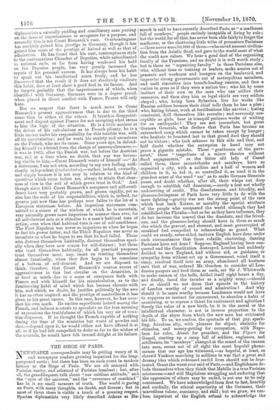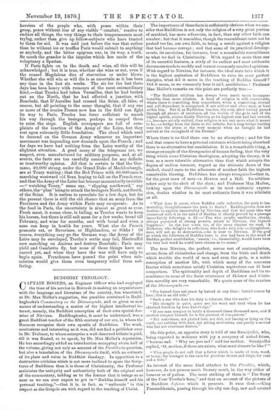diplomatists a naturally yielding and conciliatory man putting marck is
said to have recently described Paris, as " a madhouse on the dress of imperiousness or arrogance for a purpose, and full of monkeys," people entirely incapable of living by rile; assuredly this is not Count Bismarck's case. Overbearingness but the world, for all that, has never been able fairly to forget the has certainly gained him prestige in Germany, though it has madhouse, or the chattering little tribe of premature Parisians gained him some of the prestige of hatred as well as that of —there never were30,000 of them—who saved nascent civiliza- admiration. He has found that his curt, contemptuous style tion from the Asiatic flood, and gave to the world most of what to the contumacious Chamber of Deputies, while subordinated the world now values. We hear a good deal of the organizing to national ends, so far from having weakened his hold faculty of the Prussians, and no doubt it is well worth study ; on the Prussian people, has very greatly increased the but is there no " organizing faculty " in these Parisians also, repute of his personal success. It has always been his habit who, without time or training or leaders, make armies out of to speak out his intellectual scorn freely, and he has peasants and workmen and loungers on the boulevard, and discovered that the result if it does not absolutely vindicate improvise strong governments out of metropolitan members, this habit, does at least show a good deal in its favour. And and melt statuettes into breech-loading cannon, and face a he forgets probably that the imperiousness of which, when nation in arms as if they were a nation too ; who hit by some identified with Germany, Germans were in a degree proud, instinct of their own on the man who can utilize their when placed in direct conflict with France, France will only resources, and thea obey him as legal chiefs are very seldom
hate. obeyed ; who, being born Sybarites, live for weeks like
But we suspect that there is much more in Count Russian soldiers because their chief tells them he has a plan ; Bismarck's present aggressiveness that is due to the third who, hating labour, work at fortifications like navvies ; hating cause than to either of the others. It breathes disappoint- constraint, drill themselves like recruits ; and nervously sus- meat and disgust against France for not accepting what seems ceptible as girls, bear in tranquil patience weeks of waiting to him the logic of the situation. He is a little anxious at for an earthquake I They are not journalists, but great the defeat of his calculations as to French pliancy, he is a German Generals, who declare that Paris has become an little uneasy under his responsibility for this terrible war, with entrenched camp which cannot be taken except by hunger ; all its uncertainties ; and he vents his anxiety and uneasiness who hesitate to bombard lest in that grand duel they should on the French, who are its cause. Some years ago, in defend- not be victors ; who look askance to this side and that, and ing himself to a friend from the charge of unscrupulousness,— half doubt ' whether the enterprise in hand may not it was in 1865, after the Danish war, but before the Austrian prove a gigantic mistake. These " gentlemen of the pave- war, and at a time when, no doubt, that war was becom- meat," these "tragedians of a minor theatre without ing visible to him,—Count Bismarck wrote of himself :—" As fixed engagements," as the bitter old lady of Cassel a statesman, I am not even, according to my own feeling, suffi- called them, these mountebanks and monkeys, have so ciently independent (racksidaslos),—rather, indeed, cowardly, organized a city, with a million and a half of women and and simply because it is not easy in relation to the kind of children in it, so fed it, so controlled it, so used it in the questions which come before me, always to attain that clear- grandest sense of the word "use" as to make German Generals ness of view in the soil of which grows trust in God." And pause, and doubt whether, after all, their whips cut deep though since 1865 Count Bismarck's arrogance and self-confi- enough to establish full dominion,—surely a feat not wholly dence have very probably grown, and grown rapidly, yet so undeserving of credit. The dissoluteness, and frivolity, and also has the scale of his responsibilities, which is, indeed, far pleasure-lovingness of Paris have very little to do with the greater just now than has perhaps ever fallen to the lot of a mere fighting—gravity was not the strong point of the race European statesman before. An imperious statesman corn- which beat back Xerxes, or morality the special attribute mitted to a course of the wisdom of which he is uncertain, of the people who conquered the world although they had very naturally grows more imperious in manner than ever, for established the Floralia—but so far as they have influence, they all self-distrust acts as a stimulus to a man's habitual tone of do but increase the marvel that the dissolute, and the frivol- action, even when that habitual tone is one of self-confidence. ous, and the pleasure-loving should have in them so much The First Napoleon was never so imperious as when he began else which the gravest, and sternest, and most preoccupied of
Gospel, starting up a camp full of soldiers, engineers, and artillerists, its "monkeys" changed at the sound of the cannon THE SLEGE OF PARIS. into men, seems out of all sight the most hopeful pheno- heroism of the people who, with peace within their grasp, peace without loss of any visible "comfort," resolve to endure all things, the very things to their temperaments most trying, rather than give up fellow-subjects who have trusted to them for aid. It was said just before the war that rather than be without ice or truffles Paris would submit to anything or anybody, and the bitter. epigram was, in its way, a truth. So much the grander is the impulse which has made of the voluptuary a Spartan.
If Paris fights on to the death and wins, all this will be acknowledged ; but it is true, whether she wins or not, even if the roused Magdalene dies of starvation or under blows. Whether she will win or will die is as uncertain as it has been any time in the last six weeks. The air for the last three days has been heavy with rumours of the most extraordinary kind,—that Trochu had taken Versailles, that he had broken oat on the North, that he had effected a junction with Bourbaki, that D'Aurelles had crossed the Seine, all false, of coarse, but all pointing to the same thought, that if any one or more of the armies France now has in the field can fight its way to Paris, Trochu has force sufficient to smash his way through the besiegers, perhaps to compel them to raise the siege. English newspapers are full of com- plaints of the inaction of the Army of the Loire, but they rest upon extremely little foundation. The cloud which used to descend on the German Army whenever an important movement was impending now descends upon the French ; and for days we have had nothing from the Loire worthy of the slightest attention. A good many of the telegrams are, we suspect, even manufactured for military purposes, and, at all events, the facts are too carefully concealed for any definite or trustworthy opinion. All that is certain is that the Ger- mans, 40,000 strong, under the Grand Duke of Mecklenburgh, are at Toury waiting ; that the Red Prince with 80,000 men is marching westward vi4 Sens, hoping to fall on the French rear, and that the Army of the Loire has become momentarily invisible —" watching Toury," some say, "slipping northward," say others, the "plan" being to attack the besiegers North, not South, of the Seine. It is useless to speculate for a few days, but for the present there is still the old chance that an army from the Provinces and the Army within Paris may co-operate. As to the food in Paris, the uncertainty is almost as great as ever. Fresh meat, it seems clear, is failing, as Trochu wants to keep his horses, but there is still salt meat for a few weeks, bread till February, and wine for months, and with bread and wine, a man can keep in health for years. What else do French peasants eat, or Bavarians, or Highlanders, or Sikhs V Of course, everything may go the German way, the Army of the Loire may be enveloped, Trochu's sortie may fail, Manteuffel now marching on Amiens and destroy Bourbaki ; Paris may yield and Gambetta fly, but none of these things have oc- curred yet, and when they have the war will have only to begin again. Frenchmen have passed the point when sub- mission would give them even temporary relief from suf- fering.



































 Previous page
Previous page